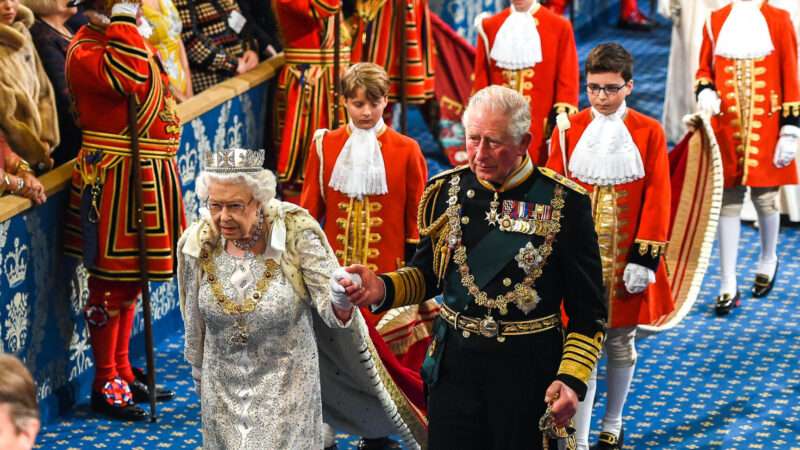
With Queen Elizabeth II's passing, the United Kingdom enters not just a period of mourning, but of huge uncertainty. The queen provided a constant presence during 70 years of change—but she played another role. Given that she enjoyed such affection from the British people, she saved us from having to think about the inherent contradictions of a hereditary monarchy and our anachronistic constitution.
Brits loved the Queen, even though deep down plenty of us know hereditary rule is a terrible idea—as it consistently proves in other countries (even U.S.-style political dynasties are bad enough). For libertarians, the monarchy would always be a tricky sell. The fact the modern British royal family doesn't actually interfere isn't the point. It's the fact they could.
But thanks to Queen Elizabeth, it was possible to put those reservations aside. Instead of an affront to liberal democracy, we saw a noble figure who embodied much of what was good about our country, and we made peace with that. Better to focus on more important battles (like stopping people from being prosecuted for offensive tweets).
For years now, active republicanism (i.e., anti-monarchism) has been a profoundly "low status" opinion in Britain. People who insist on calling the monarchy undemocratic have become a bit like those folks who insist on telling you Jesus wasn't white. Deep down, everyone knows they're right, but it's so irritatingly performative and smug you almost want to disagree with them.
Some more traditional conservatives don't even worry about the contradictions of monarchy and instead actively embrace their lowly role as "subjects." One of Britain's most prominent conservative writers, Charles Moore, once said that journalists should suppress stories to protect the monarchy from embarrassment. Likewise, I once asked a Brexit-supporting friend if there was anything that would change his mind on the issue. Yes, he said—if the queen called for it to be overturned.
That last point goes to the heart of it. Part of the reason Brits have found it easy to accept a system in which democracy only functions with permission from the sovereign is that we've had a ruler who was impeccably neutral. But what if that changed?
In 2014, British playwright Mike Bartlett asked that very question. In Barlett's play (eventually broadcast on the BBC) King Charles III, the newly-crowned monarch refuses to give "royal assent" to a law dealing with press regulation. As no law passes in Britain without the approval of the monarch, the country is thrown instantly into crisis with violent protests leading to an eventual abdication.
Could it really happen? Who knows. In 2015, our Supreme Court approved the release of the "black spider" memos, a volume of letters sent by the then-prince of Wales (now King Charles III) to various government ministers over the years. The correspondence revealed that the heir apparent frequently leaned on government ministers, calling for everything from better equipment to be sent to British troops in Iraq and for the National Health Service to spend more on homeopathy.
Of course, Charles won't even have to write letters. One of the duties of any British prime minister is to attend a weekly audience with his or her monarch, during which no topic is off the table. Such discussions are kept strictly private (on pain of treason). But there is no corresponding promise that the monarch won't express an opinion or two here and there.
We already know that one of our king's favorite topics is climate change. His regular proclamations on the subject (including sympathy for Extinction Rebellion, the protest group whose disruptive antics have become a bugbear for the conservative media) are seen by some as bossy and elitist. As a result, his opinion poll ratings have struggled (yes, our hereditary monarchy is subject to opinion polling).
Did his missteps as prince of Wales make republicanism more palatable? Not really, although many Brits believe the monarchy should "skip a generation" and "appoint" William instead of Charles. In such conversations, it felt churlish of me to point out that the whole point of a monarchy is that you don't have a say.
But (semi-) republicans have weak points too. Can anyone definitively say Britain would be better without the monarchy? And wouldn't the process of becoming fully republican stoke so much division so as to be counterproductive? Perhaps it's understandable, then, that many republicans end up quietly deciding that it's better to stick with the status quo.
Of course, if the monarchy were to break away from its own tradition of neutrality we might have a very different proposition. But I suspect most people just hope we never get to that moment—even if we don't say it out loud.
The post If Monarchy Is a Must, Keep It Neutral appeared first on Reason.com.







